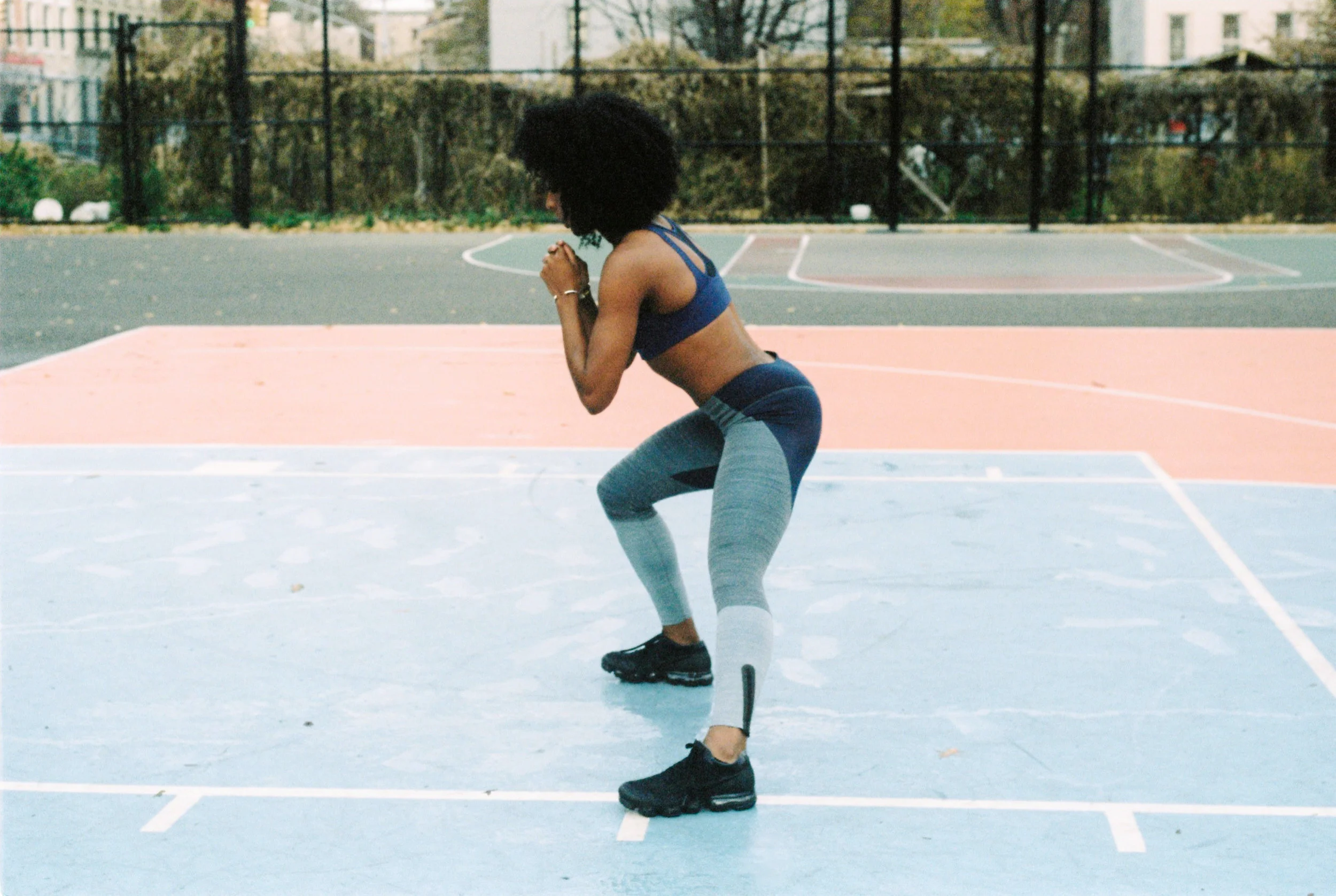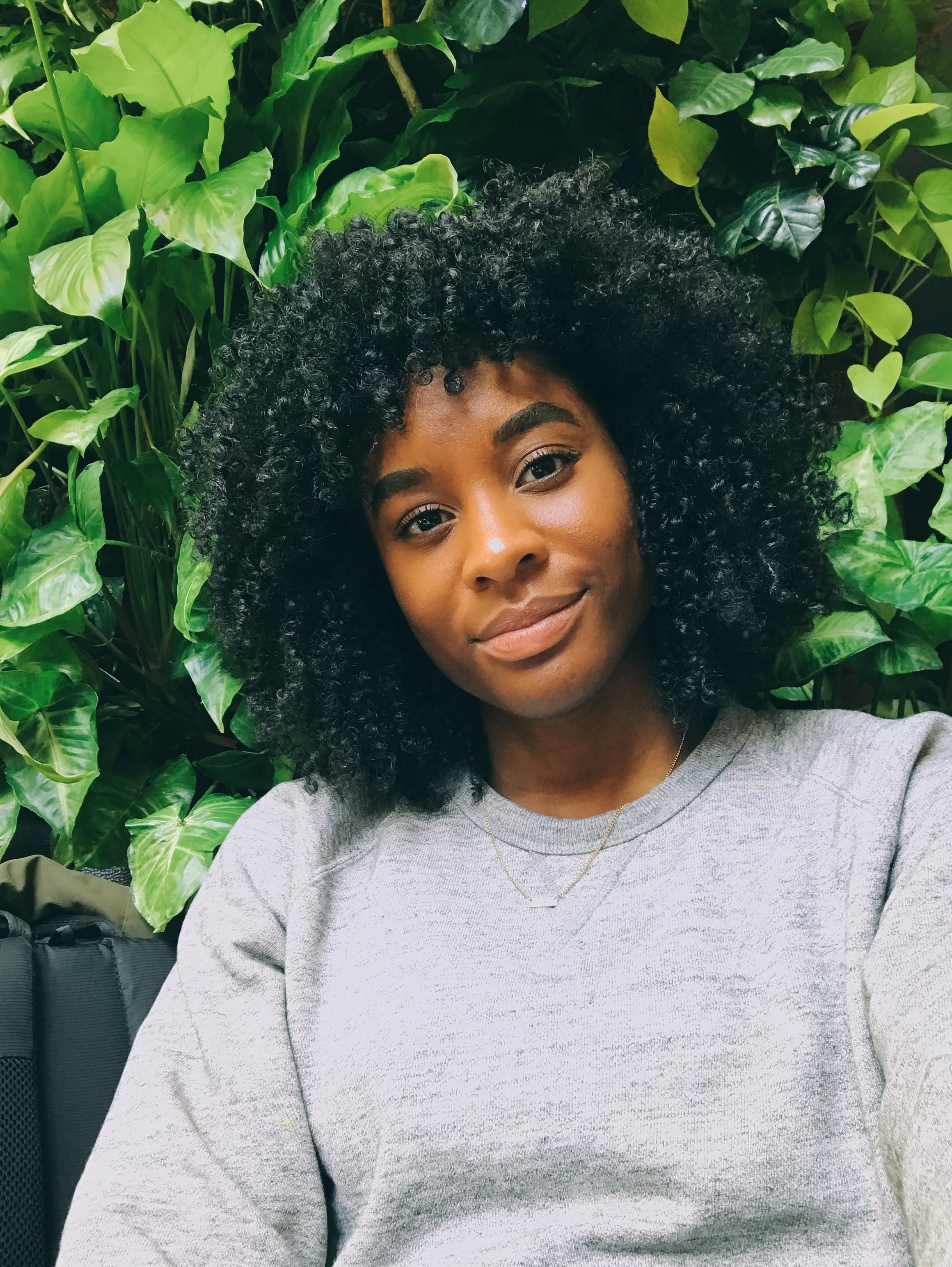Inspired by Michelle: on fitness, mental health and therapy as self care
Photograph by @joshuakissi
Happy Tuesday everyone! Another month is over and we're already eight days into May! April went by wayyyy too quick again and after a couple running related - marathon heavy weekends (supporting and organizing for the Boston and NJ Marathon), it was nice to be back home and spend some time in Brooklyn this weekend. Sleeping in, taking care of myself, running — and yes, doing laundry!
It’s May now and one of the women who joined our monthly @WOCFORWARD club this past Sunday mentioned that May is also Mental Health Awareness month! Yay! What a coincidence since I am sharing a very special interview with you all today. I sat down with my friend Michelle Marques—fitness trainer, mental health advocate and overall incredibly strong woman—recently and chatted about not only her health and wellness journey but also on how she identified her mental illness for herself and how she found ways to live with it on a daily basis.
By the way, her Instagram is full of positive affirmations where she shares her unique story, so I hope you connect with her and enjoy this feature to the fullest. Also! Michelle will be leading a strength workout for next month's @WOCFORWARD event so there you'll have a chance to meet and speak to Michelle in person, too!
Let’s get right into it:
Michelle, tell us a bit about what you do...
I am a personal trainer and I’ve been doing that since December 2017. I mostly train individual, so one on one sessions. I do some group sessions as well and I do work out a lot myself. I do mostly functional strength training, conditioning and weight lifting.
So, I know that you've studied something else, how did you find your passion for fitness and now even turned it into your full-time job?
Before working in fitness, I was in college for journalism and Africana studies, and after college I decided I didn't want to be a journalist. I worked in advertising and I didn't like that, I decided I was going to grad school. So, I went to grad school for two years to study African American studies at Columbia and I thought this was a good test to see if I wanted to do a Phd, and during that time, I had a flexible schedule and I was able to work out a lot. I had already started working out a year after college because I was just really tired of the way I looked, I was tired of being out of shape and then by the time grad school was going on, I ramped up my training and after I graduated from grad school, I was applying to a lot of jobs that I didn't really want.
How did you identify that you didn't like them?
Well, because I was applying for jobs that seemed to look good on paper. They were in an office at pretty respectable places and I didn't really know what I wanted to do... so after I graduated, I knew I didn't want to do a Phd, so I was like: ok I want to work in non-profits and the arts because I do really like culture... but you know when it really hit me was, when I actually got a job at a non-profit organization and they let me do a one-week trial to see if I liked it, so this was before they hired me.
So, when we did this one-week trial, every day that I came home from work, I would feel so miserable. I just wanted to throw up and I realized, I was getting a physical reaction to this job. My stomach was hurting me all day long, I was super nauseous and I didn't know if I could work in an office for 8 hours. I knew that that job was me saying goodbye to the fitness ideas brewing up at that time so I was already thinking about becoming a trainer... During that time, I was also studying a little bit for the personal trainer certification test and I was like: I can't do both. At the end of the trial, they offered me the job and after reflecting, I knew ‘This was a good job but I am not going to feel good about it every day I come home.’ So, I turned it down and went home wanting to study to get a certification in training and become a trainer.
I saw that you shared your mental health illness on social media recently and there, you mention the stigma involved in it, would you like to share a little bit about that?
Yeah for sure! I had depression since I was 15 years old. I didn't know what it was back then, I just knew that I didn't feel happy. I would constantly tell my dad: I feel weird, I don't feel good. I never feel happy. My dad was like: what does that mean? I was like: I don't know, I never feel good. Even though, nothing seems wrong. For my birthdays and christmas, I would be excited but on the day to day, I would never feel good about anything, I would just have this negative outlook on everything. It was very vague and my dad decided to go see a therapist and when I saw one, it helped a lot. So that was awesome! I was also super perfectionist and I wanted to go to a really great college, so I was super hard on myself so that would bring me down sometimes, too. Then, when I got into NYU, I was so happy and thought all my problems are gone away, there's nothing to worry about. I stopped going to therapy and my dad was like: I feel like you're doing better and don’t need to go to therapy every week anymore.
So from 15 on you went to therapy every week?
From 15 to 16, I went to therapy every week and then after 16, entering my senior year, I started going less, maybe like once a month and then by the time I went to college, I stopped seeing a therapist. Then, freshman year of college, some of those feelings came back and I did go to therapy for like two months. There is a limit of 10 sessions in college that you can do... so after I did the 10 sessions, I stopped. I felt like I was working on things and we were getting somewhere but then after 9 sessions, you think: ok one more and then I have to do this on my own again.
The transition from high school to freshman year was super hard for me. The workload was heavier and I didn't have the greatest study habits either even though I was a good student in high school. My study habits weren’t good for college…they were wait last minute and cram everything. You can’t really do that in college. Some people can handle it, but I couldn’t do it. I’d get terrible grades and I would be so down. Depression is super hard to explain. It's that ever consistent feeling of something feels off and there’s a gray cloud above your head. Your perception is a negative view of life, so those feelings started to creep up more.
My sophomore year felt fine, I definitely wasn’t excelling in school but felt whatever about it. Junior year, I had some more depressive issues, too. I was really down and had to withdraw from one class. My parents weren’t happy about it, but they understood. My worst depression happened in senior year... by that point it was just an accumulated untreated depression but it was kind of getting a little bit better, on and off therapy.
College was ending soon and I didn't know what to do with my life. I didn’t know if I was good enough to be a professional writer. Writing would often trigger my depression because it was this perfectionist thing and I felt like everything I wrote wasn’t good enough. Then in my senior year, I just stopped going to classes. I had so much work to do I felt like I wasn't doing well. I had a journalism project to do where I was like: it’s gonna suck.
My work was super behind, I hadn’t turned in 50% of my final grade in assignments. And then, I started going to a therapist again through the school. Again, there was a cap on how many therapy sessions I could do, so I had to find someone after that and I also had to start taking medication, all without telling my parents which was crazy, too. They had no idea, they would call me and I would pretend and say I was fine even though I hadn’t gone to school in two days. I told my brother eventually and he was super supportive but he was definitely like: you should tell our parents.
Photograph by @mallikaphoto
Photograph by @mallikaphoto
Eventually I told my dad, he was super concerned and he was always skeptical of medication as well so he didn't feel great about me being on that, and then eventually my therapist recommended me that I take a leave of absence from school. Work had surmounted to so much because I wasn't catching up. I could sleep for 16 hours and no one would know. I finished fall semester with 4 incompletes, so that meant that I am not going to receive grades until I handed in the work that I missed. Spring semester I was supposed to graduate from college but I withdrew with a medical leave of absence.
I took the medical leave because there was just no way I was going to graduate on time so the spring semester I got all Ws and none of my money back. My mum was very upset about that fact. One semester of NYU, thousands of dollars gone and then the other semester, as long as I handed in the work that I missed, I could get grades for that, so that summer I worked on finishing the projects from fall which was super hard. You are months behind and you have no motivation, you're depressed and you're living back at home. My mum doesn’t really understand depression, she thinks I just need vitamins.
It was hard for her... we’re West Indian, both my parents are from Guyana and mental illness is not something that people are very knowledgeable about, it’s not something people take seriously and I think they just associate it with being crazy or off, so my mum comes from that background and she just doesn’t understand. My dad was more like: I am going to look it up on the internet and going to learn more about it, I am going to listen to you. So he was really supportive. He took a week off from work, the first week I moved home which was nice and he would be like: let’s take a lap around the block and then take a nap or come to the movies with me and then take a nap after if you want.
I would have no energy, so it was hard to mobilize and get that energy to do the work I missed. It became a burden and at some point my therapist was like: you just need to hand stuff in. It doesn’t matter, it’s like a year behind... We just want you to start fresh, it doesn’t have to be a master piece and that’s hard for me, as a perfectionist, to just hand in stuff that I don’t think is great but I had to realize that my perfectionist triggers my depression. Holding myself to a standard that cannot be achieved is just not healthy. I did go back to school the fall after and I had 4 classes to graduate so I decided to just do two classes in one semester and two in another. So, in the spring of 2013, a year after I was supposed to graduate, I graduated from college. I got better eventually and over the summer, I found a medication that worked for me.
Now, I haven't stopped going to therapy since then. From 2012 until now, I’ve been seeing a therapist consistently, same person on a weekly basis. My dad is the greatest person I’ve ever met, but he had the mentality: ok how many sessions do you need to get better. With depression, you don’t get better really, you learn to manage it and you can be stable but it’s never going to be gone. It’ll never be like: ok this is the last time I’ll experience depression ever again in my life. There will be triggers and there will be stuff that come up in your life. A lot of it is about reframing thoughts and — if you don't know how to do that you just need a major life experience to happen to put you right back into that place.
Everything could be fine, but maybe you lose your job, or something happens and for a non-depressed person, they will be sad but they will figure out a way to get past* it, but when people are depressed the balancing out is almost impossible sometimes. It’s so hard to mobilize yourself out of that sadness, and I feel like because I’ve been to therapy for so long, it’s been helpful to have practices that keep me out of depression.
Photograph by @cbufordnyc
Do you have any advice for anyone seeking out help for mental illness? Also, how do you define it? How do you know you have depression?
It’s really hard to define and I am not a doctor, so I don’t have a specific advice. I just know, everyone experiences sadness, and depression is that persistent sadness that no matter what you do, you cannot see through it. It doesn’t go away and it feels like a black cloud hanging over your head. People who are sad and are having a bad time, they know what will get them out of it, and they get out of it fairly quickly, independently or with support of others, but it’s not a persistent thing. Depressed people... you start not caring about living life… I don't really care if I see my friends, I don’t really care if I have fun today or not. Nothing feels fun anymore. That’s the difference, when it starts to affect your day to day functioning in a debilitating way, that’s when I think it is depression.
Mental illness is getting a lot of discussion time now, in the media and in public spaces, but I think for people of color, we still have a long way to go cause we’re still on the wave of: we don’t need therapy, therapy is for white people. Depression is a white person thing and we’re still on that and that’s bad. Therapy doesn’t work for everyone, but you need to have a lot of patience, you might have to see more than one therapist, they might not work out for you, you’re not going to click with every therapist and every therapist uses different methods. You need to be patient and consistent. You have to really commit to going every week for whatever amount of time.
Photograph by @joshuakissi
This is the hardest one: having patience for the people around you. I used to be a very angry person with my depression. People who didn't understand it, I would be so pissed off at them but actually, a lot of people just don't understand it and it sucks to have to explain and teach people but that’s the only way forward. If you don’t teach people, we’re going to continue thinking this is not a real illness. So, you have to have patience for the people who aren’t informed and skeptical but at the same time, you have the right to get rid of toxic people in your life. If they are triggering your depression and you don’t have the strength to teach them what it is, you have to let go of these people. I lost some friends, when I was in a depressed episode, I was just tired and did not gain the strength to explain this to them and if they didn't believe it, then that’s it. A little bit of patience is necessary, but not so much that you start sacrificing your own well-being.
Any tips to become more active? And maybe tell us a bit on how working out has helped you with your mental illness?
Working out has helped me a lot and I always wonder what would have happened if I started working out a bit earlier because I only became active in 2014. It’s been only 4 years, so my major depression happened before that. I know now that fitness helps my mental illness a lot — the endorphins, the sweat, feeling good about the way I look, feeling good about my strength level, all those things make me feel good so it's definitely an anti-depressant.
For people starting to be active I would say: start small. Everyone wants to do some extreme shit right away and that's the thing... people want to run a marathon, but haven’t even worked out for 10 minutes. It’s great to have long-term goals and it’s great to jump into something really passionately, but the more extreme the thing is, the less likely you’re going to do it. If you follow some extreme workout plan, maybe you’re going to do it for 2 weeks, maybe you’ll get to a month, I’d be surprised, but then you’re going to fall off. Your body is exhausted, you're not used to it. Exercise needs to be gradual.
Even if you want to commit to two 30 minute workouts this week, starting at 0, that’s a big commitment, that’s huge! 30 minutes of consistent exercise! I feel the same way about dieting, too. Eating... I don’t think extreme or restrictive meal options work for people. I think it’s about small behavioral changes. I do like a lot of those fitness apps, like the Nike Training App, there are some really good boutique fitness classes in Soho as well, but start small and celebrate those small victories first. If you try to get into it really heavy, you're going to hate working out and you're probably going to stop doing it. You have to be super patient with the results, too, it’s all gradual.
I remember going to the gym when I never worked out, that was a triumph itself. Sometimes, I did try to do some crazy stuff, like really heavy endurance running when you have no experience with that, but that’s not the way. It’s really about the small steps and feeling good about them, like stop going on Instagram and looking at this or that person doing the most. You can do the most eventually, but wait until you get there. You have to do small steps. As a trainer, the people who did the small steps and slowly progressed, like every week we go a little bit harder, they are the most consistent versus the people who just do a super rigorous workout plan right away, those people just drop off. They never sustain it.
Photograph by @joshuakissi
How do you take care of yourself? What are your self care rituals or treats for Michelle?
I will admit as a wellness person, my self care could be better. Right now, therapy is one of them. Working out is a form of self care, too. I would like to practice more mindfulness. I have some mental clutter so I am interested in learning to meditate, so I’d love for it to be part of my practice. I am scared because part of me doesn’t believe in it. I don't know how to do it, so that’s silly and I think I am afraid to be alone with my thoughts and deal with them sometimes. I get scared. I am so intrigued by meditation and I want to try it, and I feel like that is missing in my self care practice but I have too much mental clutter that I am afraid to deal with.
I find skin care to be really good self care, too. Doing face masks and watching TV is really relaxing. I like spending time in silence a lot as well. I don’t meditate in silence but I like silence sometimes because I work in a loud environment, so when I get home I like to sit in silence and just enjoy solitude sometimes.
Wow, thank you so much Michelle for all your thoughts, for opening up and sharing your story and for continuing to lead, helping others to find their joy in fitness and wellness, too! This was amazing learning more about depression, the difficulties of it, the daily struggle, but also the learning process of Michelle’s journey and how taking care of oneself and a strong support system can help with depression.
Loved working on this piece. To my friends and readers, I hope you enjoyed this one as much as I did and let's stay open and maybe ask our neighbor or a stranger on the street, the cashier in the super market how they are doing. Like: how are they actually doing?! You never know, you might light them up to a smile!
Big love to all of you, be safe and have an incredible week,
I hope I get to hug you in person soon!
xx
Huyen







